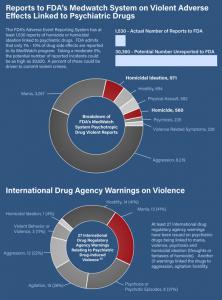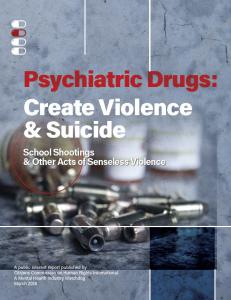
Of 409 official psychiatric drug agency warnings, 49 warn of suicide or suicidal ideation and 27 warn of violence, hostility, aggression and homicidal ideation.
One possible source of violence is addressed in a report produced by the Citizens Commission on Human Rights – “Psychiatric Drugs Create Violence and Suicide”.
CLEARWATER, FLORIDA, UNITED STATES, March 2, 2023 /EINPresswire.com/ — The increasing acts of senseless violence in our communities, as evidenced by the 95 shootings reported so far this year, has left everyone deeply disturbed and demanding answers as well as solutions. But are the right questions being asked?
As we look for the best solutions and for ways to prevent further, similar events, which seem to have reached an alarming frequency across our country, it is imperative that we think outside the box. As usual when a tragedy, such as the recent spate of mass acts of violence occurs, there is a groundswell of support for increasing gun law restrictions and an increase in mental health funding. However, these are not the correct solutions.
One possible aspect of violence in our communities is addressed in a report produced by the Citizens Commission on Human Rights (CCHR) titled “Psychiatric Drugs Create Violence and Suicide: School Shootings & Other Acts of Violence” which notes that more than 30 studies, drug regulatory agency warnings and expert opinion link psychotropic drugs to violent and suicidal behavior.
Of course, with millions of people taking such drugs, clearly not everyone will experience these reactions. But what drug regulatory agency warnings confirm is that a percentage of the population will.
Drug proponents or pharmaceutical companies with a vested interest in discounting this well-documented link may claim that “studies do not find an association between mental illness and violence or homicides, except for persons using illicit intoxicating substances or alcohol.”
And while it is correct that there’s no association between mental illness and violence or homicides, there have been no clinical drug trials conducted to establish violence as a side effect. Why? Because such experiments could not get approval by the Institutional Review Board. Instead, after a drug is FDA-approved, the drug is prescribed to thousands and adverse effects monitored over a long period. It is then that serious violent and suicidal adverse events are noticed.
The “solutions” proposed to address violence include mental health screening that oftentimes leads to prescriptions for psychotropic drugs that, in a percentage of those taking them, can cause the violent or suicidal behavior they’re supposed to prevent. One depression screening test had an 84% chance of incorrectly identifying students as suicidal.
Nationally it is estimated that more than $2 billion has been authorized and/or used for mental health and violence prevention programs in schools and foster care since 2014. This doesn’t include security equipment and services for education that reached $2.7 billion in revenue in 2017.
While we all agree that providing a safe environment in our communities is important, the role that psychotropic drugs may play in altering an individual’s behavior and mental state putting them and others at potential risk cannot be ignored.
This demands significant changes in the mental health industry. We cannot continue to throw money at this problem or continue to rely on a profession that has demonstrated no results.
There are examples of good practice, community-based mental health services that are person-orientated, recovery focused and which adhere to human rights standards. In many instances, these alternative solutions to helping people in crisis show a lower cost of service when compared to what is considered to be mainstream solutions – drugs, involuntary examination/commitment, etc.
The Florida chapter of CCHR is hosting an online event titled, “A Discussion About Mass Shootings” on March 5th at 11:30am for the purposes of:
1. Learning about some of the common factors found in cases of mass shootings.
2. Reviewing certain studies made on the subject of senseless acts of violence and suicide.
3. Suggesting resources to help identify someone likely to commit mass shootings.
4. Proposing ideas for policy reform to help prevent such atrocities from happening.
Anyone interested in attending this event may call (800) 782-2878 to reserve a spot or simply Click Here to register online.
About CCHR: Initially established by the Church of Scientology and renowned psychiatrist Dr. Thomas Szasz in 1969, CCHR’s mission is to eradicate abuses committed under the guise of mental health and enact patient and consumer protections. L. Ron Hubbard, founder of Scientology, first brought psychiatric imprisonment to wide public notice: “Thousands and thousands are seized without process of law, every week, over the ‘free world’ tortured, castrated, killed. All in the name of ‘mental health,’” he wrote in March 1969.
Sources:
U.S. Mass Shootings in 2023: A Partial List https://www.nytimes.com/article/mass-shootings-2023.html
“Psychiatric Drugs Create Violence and Suicide: School Shootings & Other Acts of Violence https://www.cchrint.org/pdfs/violence-report.pdf
“Teen Screen, Cynical Deception, Dangerous Illusion https://www.cchrint.org/2009/08/26/teen-screen-cynical-deception-dangerous-illusion/
https://www.nimh.nih.gov/archive/news/2015/combating-early-death-in-people-with-serious-mental-illness; https://www.ncbi.nlm.nih.gov/pmc/articles/PMC6918821/; https://mentalillnesspolicy.org/coping/misdiagnosis.html; https://jamanetwork.com/journals/jamapsychiatry/fullarticle/2790723
Diane Stein
Citizens Commission on Human Rights of Florida
+1 727-422-8820
email us here
Visit us on social media:
Facebook
Twitter
LinkedIn





